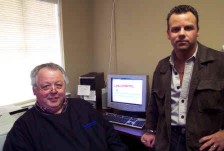 How would you like to see a show call Tranny Talk on your local cable channel. It's a show for, by, and about transsexuals. Or may be you'd rather see a program promoting the white race as the supreme race. Throw in Nazi Skin Heads and black racists and you might have a combination that will beat the line-up on "Must See TV."
How would you like to see a show call Tranny Talk on your local cable channel. It's a show for, by, and about transsexuals. Or may be you'd rather see a program promoting the white race as the supreme race. Throw in Nazi Skin Heads and black racists and you might have a combination that will beat the line-up on "Must See TV."Two men, who ran a local cable issue program, believe that's what viewers will be in for if public access television comes to Asheville and Buncombe County.
Chad Nesbitt and Don Yelton, hosts of the "Citizens Speak" program have no doubt that's what citizens are in for. They believe so strongly that such controversial programs will be carried on public access, that they are ready to buy billboards and plaster the names and faces of Buncombe County Commissioners who vote in favor of public access on them.
Don Yelton (left) and Chad Nesbitt
What is public access television?
Here is one description of Public Access television: Public access television is a means through which all members of a community have access to the most powerful means of communication in our society: television. Through cable television franchise agreements between cable companies and local governments, non-profit community access organizations provide equipment, training and channel time so that ordinary citizens can produce television programs and put them on cable television channels.
When they say "all members" they mean all.
The Association of Cable Access Producers (ACAP) says the group's mission is "to unite public access content producers and protect the public's right to access all public access cable facilities and services as provided by franchise,"
They go on to say that ACAP, a national non-profit organization, supports access by Individual Producer/Providers and members of the general public, to all public access telecommunications and production facilities, services and training, provided for public use, on a non-discriminatory basis.
The "non-discriminatory basis" includes, but is not limited to race, religion, ethnicity, disability, gender or sexual preference. They further state that, "Producer/Providers from all countries are invited to join us in our fight to preserve public access for all peoples throughout the world."
The "non-discriminatory basis" has led to some pretty interesting television.
The Detroit Free Press reported in August of 2003 that a judge in Grand Rapids, Michigan was deciding the fate of one Tim Huffman.
Huffman and his wife, Sally, are the producers of a public access half-hour variety show, called "Tim's Area of Control." The shows, which feature music, public service announcements and skits, airs at 10:30 pm. The show was usually laced with foul language, but not nudity.
However, a viewer complained to prosecutors about one skit that contained a dressed-up human penis telling jokes.
The American Civil Liberties Union says the First Amendment protects Huffman, adding that no one in the nation has ever been prosecuted for showing nudity on television.
The Detroit Free Press quoted Huffman saying, "If it's legal to show this kind of stuff in L.A., New York or Lansing, then it should be legal in Grand Rapids."
Some cities that have voted for public access television have ended up doing an about face on the issue.
The Detroit News reported that in 2002 officials in Shelby Township decided to stop funding public access television shows created by residents and said that the measure was aimed at saving money and improving programming.
"(Some shows) could be embarrassing and reflect poorly on the township," Shelby Township cable coordinator, John Martin said.
However, some cities have not found it so easy to cut off the public access channels.
In October of 2002, the St. Petersburg Times reported that a federal judge ordered Hillsborough County, Fl. to continue funding for public access. This after commissioners voted in September to discontinue funding of the channel.
Asheville and Buncombe County's public access issue will be decided by the county commissioners at their March 16 meeting.
This report was filed by Clint Parker for the Tribune.
You can contact:
Citizens Speak at their website http://conversation.suddenlaunch.com/
You can contact the commissioners at:
Nathan Ramsey
250-4006
FAX: 255-5535
nathan.ramsey@buncombecounty.org
David Young
274-2555
FAX: 274-4212
davidy@fugazync.com
Bill Stanley
828) 250-4007
bill.stanley@buncombecounty.org
Patsy Keever
250-4001
FAX: 255-5535
patsy.keever@buncombecounty.org
David Gantt
252-2852
FAX: 254-4539
commissioner@davidgantt.com
|
Association of Cable Access Producers Bill Of Rights |